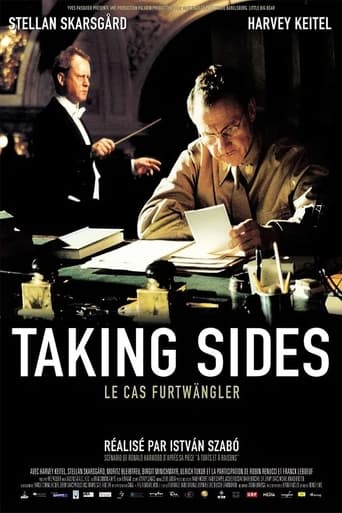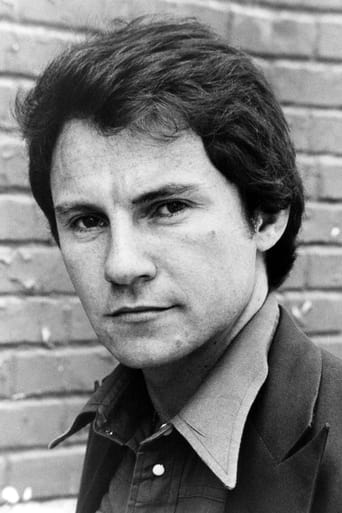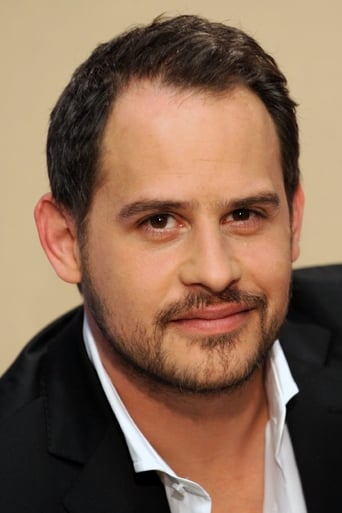Taking Sides (2002)
One of the most spectacular and renowned conductors of the 1930s, Wilhelm Furtwangler's reputation rivaled that of Toscanini's. After the war, he was investigated as part of the Allies' de-Nazification programme. In the bombed-out Berlin of the immediate post-war period, the Allies slowly bring law and order to bear on an occupied Germany. An American major is given the Furtwangler file, and is told to find everything he can and to prosecute the man ruthlessly. Tough and hard-nosed, Major Steve Arnold sets out to investigate a world of which he knows nothing.
Watch Trailer
Cast


Reviews
Taking Sides plays out in the last days, for a solid forty-five years, of Germany's existence as a unified country the aftermath of World War Two, and it centres in on a fierce tryst between an American who is a bully; aggressive and enjoys vaudeville and that of a relatively humble German composer whose life had been dedicated to classical music; appears humble but is suspected of being a Nazi. István Szabó's film is a wonderful, mostly dialogue driven piece, which in spite of rarely getting out of the office belonging to that of its central American character, takes us on a gritty adventure as the fate of one man's life hangs in the balance and the reputation of another's hangs additionally so.The film begins with a quite wonderful depiction of a full orchestra playing a classical piece to a silent crowd, but as we track and weave our way around the majesty of the location within which they play, it becomes apparent higher members of Germany's Second World War era Nazi party are in attendance and are enjoying as much as we are – the film's soundtrack dipping in pitch as the reveal arrives. The idea of Nazism lurking amidst what is, on the surface, elegant and quite beautiful goes hand in hand with what the film essentially goes on to depict; specifically, the conductor orchestrating said performance and the apparent ties he has with the German party of said time in spite of the fact surface characteristics are what they are. The war will later end, with an air raid ruining this particular performance, and a number of unseen historical events unfolding throughout the world, as we know, go on to bring about the downfall of the Third Reich thus paving way for the arrival of the Allies and their setting up of base camps all over the ruined nation.Enter Harvey Keitel's American Major, Steve Arnold; a man charged with investigating those whose role in Germany's European reign of Fascism were often enough to make a difference but were often too what they were in their nature to occupy the proverbial radar. Arnold was an insurance investigator before the war, so investigative procedure and worming out the truth the man's speciality with these assets predominant in his life up to now. Whilst on the blunt end of a superior's exposition, he watches footage over an old projector of The Final Solution in action, although does not flinch; his entry to what will be his office for the remainder of his time in Germany timed with that of the American flag going up and a group of German children running over offering goods and services as if in some sort of debt – the guard is changing as is whom the predominant force are. He works with Birgit Minichmayr's Emmi and Moritz Bleibtreu's former soldier, David Willis; two people brought in on a secretarial basis but whose own bond actually comes to form a substantial an often softer, refreshing pit-stop alternative to the predominant office set berating.The man he's asked to interrogate and suss out the true one-time identity of is a composer named Wilhelm Furtwängler, played by Stellan Skarsgård. Furtwängler, being a composer, you might say is used to driving performances of his own; keeping cool when the centre of attention and generally doing a good job in controlling what's around him. Here, he will come up against someone who has already torn apart and done his job with a handful of Furtwängler's orchestra, thus must now rely on more than the fact he has already been cleared of Nazism under another jurisdiction. The members of Furtwängler's orchestra speak highly of him when interviewed by Arnold, and in a film all about the perception of someone and an individual's true nature, we recall the dishevelled and somewhat sleepy look of the man during that opening when he conducted through the air raid and wonder if their claims are indeed as authentic as they seem.Above all else, Keitel does a superb job with his role; a man who has often played unlikeable people but whose tales we find ourselves drawn toward - here, he plays a bit of a bully and a bit of a boor, but is essentially a member of an Allied force attempting to wedge out those guilty of the things we, the audience, freely observed earlier on in the found footage session as those responsible for rather shocking manoeuvres are sought out to be brought to justice. Keitel's role is somewhat reminiscent to that of what he did in Jane Campion's Holy Smoke, from two years previously, in that he is a big; brash; booming; charismatic all-American who's called into town to cause someone specific to 'crack' into reverting to what they were prior to, what superiors deem to have been, selling their soul. He, like everyone involved in the production, deserve praise.
My husband and I discussed this movie into the wee hours of the morning. We were very impressed by Harvey Keitel's performance in particular, (a "you can't handle the truth" moment!). Liked the way the characters were representative of people at the time, i.e. Keitel's character representing world outrage and disgust, determined to not only be "seen to be just" but to exact justice; Bleibtreu's supposed Jewish apathy, his admiration for Furtwangler impossible to conceal; Skargard's naivety in believing the purity of art could be kept separate from politics; Emmy's guilt; the second violinist admitting opportunities were opened up for his inclusion into the orchestra. Loved the end narrative and particularly last bit before the credits ran.
Ironically, the main limit of Taking Sides is how it doesn't want viewers to choose which side to take - it's clear who the filmmakers side with.Germany, World War II aftermath: Major Arnold (Harvey Keitel) investigates the involvement of famous conductor Wilhelm Furtwangler (Stellan Skarsgard) with the Nazis. As a tense confrontation between the two unravels, the movie focuses on the moral responsibility of intellectuals who supported the regime.Furtwangler, we learn, used his authority to help several Jews and support the nation with his art; Arnold sees him as morally bankrupt, as he accepted the regime instead of openly condemning it.Skarsgard is exceptional as Furtwangler, playing him as a dignified man who is at the same time humiliated by his plight and proud of his work. Keitel is a great actor, but he is saddled here with a character written as boorish and one-dimensional. The movie obviously sides with Furtwangler - fair enough, but, to make sure viewers agree, the Major is painted in a very unflattering light and comes across as a straw man. It's a cheap shot for an ambitious script.Still, Taking Sides juggles with important questions and the epilogue is powerful, with a broken Furtwangler descending a staircase in an empty building while Beethoven's Fifth plays in the background, and then footage of the real Furtwangler who seems to be wiping his hands with a handkerchief after shaking them with the Nazi authorities.6,5/10
The movie starts with that Ludvig Van Beeethoven's masterpiece and it ends with the same piece.The movie is set just after The Second World War.Harvey Keitel plays Major Steve Arnold.His job is to find out whether the conductor Wilhelm Furtwängler (Stellan Skarsgård) belong to the Nazi party.Taking Sides (2001) is an impressive movie with a terrific cast.Harvey Keitel is magnificent in the lead.When he raises his voice to Furtwängler...that's really something.Stellan is amazing.Moritz Bleubtreu and Birgit Minichmayr are both great.This is a very well made movie about the true events.I think all those cruel and detestable men had to go down for what they did.This movie makes you think.Tell me this: Is a person who made it all happen worse or a person who knew and didn't do anything?







